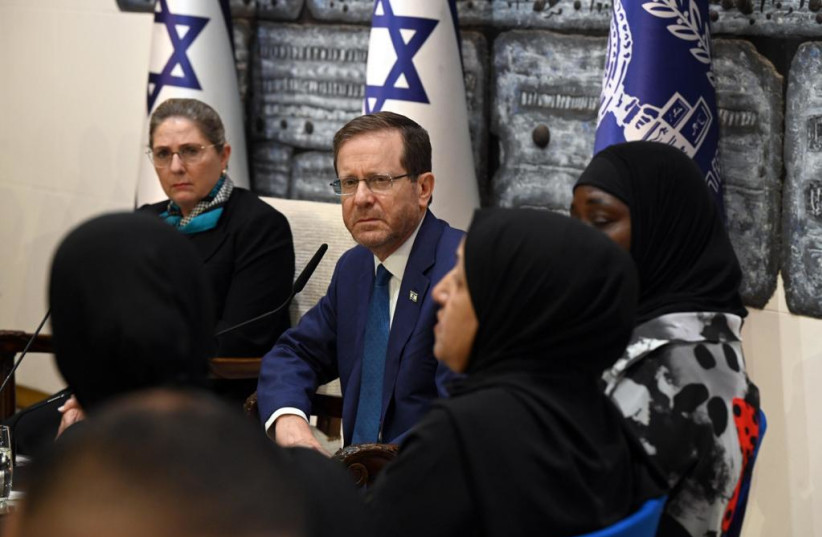Arabs, like Jews, are not a homogeneous group. They are affiliated with different streams, with certain similarities, but also with certain variances that distinguish one from another.
This was obvious on Sunday at a gathering at the President’s Residence of some 40-50 Arab women who have lost loved ones in the wave of Arab violence that is sweeping the country.
Not all wore hijabs, and not all came from the same region. What they had in common was bereavement and grief.
President Isaac Herzog and his wife Michal had invited them in order to hear their personal stories and the manner in which they coped.
“We are dealing with a terrible catastrophe, and we have to find a way to combat this together,” said Herzog.

“We understand your pain,” added Michal Herzog.
Listening to the pain of Israel's Arab women amid a wave of crime and violence
Both Herzogs said very little. They were there to listen and to learn. Herzog leaned forward in his chair as each woman spoke, his face reflecting the empathy he felt for her.
Some of the women came clutching photographs of dead loved ones, and when they spoke of them, they occasionally found it difficult to continue because of the lump in their throats. One woman could not restrain her tears.
A common theme ran through nearly all the stories. The government had done nothing for them. The police gave them short shrift and minimal respect if any, and the perpetrators had not been found. When violence was taking place and it was still possible to prevent loss of life, police were tardy in coming to the scene.
The women who told their stories spoke excellent Hebrew. Some work in hi-tech, in medical professions or as teachers.
Before the Herzogs entered the room, there an aura of sadness pervaded. No-one smiled. Facial expressions were somber, and there was barely any conversation.
A feeling of hopelessness and helplessness permeated the room.
What the women wanted was to have their rights properly addressed. “Israel is supposed to be a democracy, and I’m a citizen, but I don’t receive the rights due to me,” said one woman. Others complained that outside of their families or immediate communities, no one asked if they needed help of any kind. In one case where a woman was left to fend alone for her large brood of children, social welfare authorities wanted to take her children away from her. She is now fighting in court to keep her family together.
Another woman said: “What I want is to feel safe and secure,” while a third said that she was disappointed with the system.
“How does a mother tell her children that they will never see their father again?” queried yet another woman.
The women were joined by one man, a teacher by the name of Yusef Salim, whose son was murdered. Salim corroborated all that the women had said and in an angry fit of anguish asked why Israel can provide humanitarian aid to people suffering tragedies in other countries, but can’t do the same for its own Arab community.
The Herzogs pledged to support the bereaved Arab families. The president also mentioned legislation that is already in place, and was told that while it exists, it has not been implemented.
“It’s not just the women here, who are affected,” said Michal Herzog. “The violence affects all of us.”
In promising his support to resolve the grievances that he had heard, Herzog said: “Terror is a threat to all of us. We have to collectively say Enough! Otherwise, tomorrow we could wake up and see that violence has escalated.”
Generally speaking, with rare exceptions such as Israel Independence Day receptions and state dinners, events at the President’s Residence are concluded within an hour or less. This one went on for considerably longer because the president wanted to give each woman who wanted to speak, the chance to have her say.
